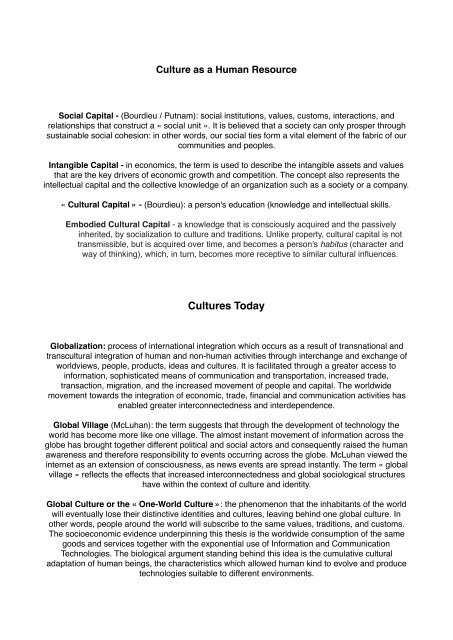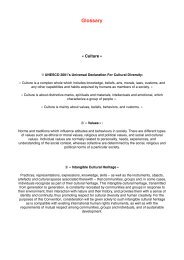Awareness Trainings - Draft #1
You also want an ePaper? Increase the reach of your titles
YUMPU automatically turns print PDFs into web optimized ePapers that Google loves.
Culture as a Human Resource<br />
Social Capital - (Bourdieu / Putnam): social institutions, values, customs, interactions, and<br />
relationships that construct a « social unit ». It is believed that a society can only prosper through<br />
sustainable social cohesion: in other words, our social ties form a vital element of the fabric of our<br />
communities and peoples.<br />
Intangible Capital - in economics, the term is used to describe the intangible assets and values<br />
that are the key drivers of economic growth and competition. The concept also represents the<br />
intellectual capital and the collective knowledge of an organization such as a society or a company.<br />
« Cultural Capital » - (Bourdieu): a person's education (knowledge and intellectual skills. .<br />
Embodied Cultural Capital - a knowledge that is consciously acquired and the passively<br />
inherited, by socialization to culture and traditions. Unlike property, cultural capital is not<br />
transmissible, but is acquired over time, and becomes a person's habitus (character and<br />
way of thinking), which, in turn, becomes more receptive to similar cultural influences.<br />
Cultures Today<br />
Globalization: process of international integration which occurs as a result of transnational and<br />
transcultural integration of human and non-human activities through interchange and exchange of<br />
worldviews, people, products, ideas and cultures. It is facilitated through a greater access to<br />
information, sophisticated means of communication and transportation, increased trade,<br />
transaction, migration, and the increased movement of people and capital. The worldwide<br />
movement towards the integration of economic, trade, financial and communication activities has<br />
enabled greater interconnectedness and interdependence.<br />
Global Village (McLuhan): the term suggests that through the development of technology the<br />
world has become more like one village. The almost instant movement of information across the<br />
globe has brought together different political and social actors and consequently raised the human<br />
awareness and therefore responsibility to events occurring across the globe. McLuhan viewed the<br />
internet as an extension of consciousness, as news events are spread instantly. The term « global<br />
village » reflects the effects that increased interconnectedness and global sociological structures<br />
have within the context of culture and identity.<br />
Global Culture or the « One-World Culture »: the phenomenon that the inhabitants of the world<br />
will eventually lose their distinctive identities and cultures, leaving behind one global culture. In<br />
other words, people around the world will subscribe to the same values, traditions, and customs.<br />
The socioeconomic evidence underpinning this thesis is the worldwide consumption of the same<br />
goods and services together with the exponential use of Information and Communication<br />
Technologies. The biological argument standing behind this idea is the cumulative cultural<br />
adaptation of human beings, the characteristics which allowed human kind to evolve and produce<br />
technologies suitable to different environments.




